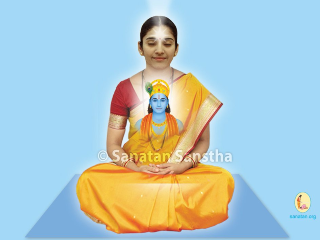
Bhav (Spiritual emotion) towards the Guru is vyashti
bhav while seeing the Guru in other seekers is samashti bhav.
When a seeker receives spiritual experiences about God and the Guru, at first, he develops faith in them and then bhav for them is generated in him. This bhav is called ‘vyashti bhav’. Bhav in which you think of God when performing actions and perform every action for Him is called vyashti bhav. Obedience unto the Guru, promptness, wholeheartedness and completely following the Guru’s advice with full faith, immense faith in the Guru, expressing gratitude unto Guru continuously, expression of surrender, humility and sacrifice unto the Guru, intense desire to go to the Holy feet of the Guru are the essential virtues for vyashti bhav.
Bhav in which you feel every action is being performed for God, God’s mission is yours and therefore, whatever action takes place is with God’s wish, is called ‘samashti bhav. Samashti bhav is a wish that all jivas should go to God.
1. Stages in the awakening of vyashti bhav
A. Love
When performing vyashti sadhana, a seeker begins to love the form of God which he likes and the Guru who guides him in sadhana (Spiritual practice).
B. Communion
The seeker sees the forms of God and the Guru continuously. Their virtues, grace showered upon him and guidance is remembered all the time. That is why, he learns to remain in communion with God and the Guru.
C. Bhav
Remembering them always awakens bhav in the seeker and a state of bhav is generated. He cannot tolerate separation from God and the Guru even for a moment. Just like a fish out of water, the seeker pines for God and the Guru. He mentally surrenders to them and has no aim other than to realise God or to merge with the Guru. Such a seeker is assisted by God and the Guru from within, and his bhav always remains awakened.
D. Krutadnyatabhav (Spiritual emotion of gratitude)
Since God and the Guru constantly guide him in sadhana, his bhav grows further and he feels gratitude towards them. Once this krutadnyatabhav grows, Anand (Bliss) increases too. At this stage, a seeker truly realises that ‘progress in his sadhana can take place only with the sankalpa (Resolve) of the Guru’, and he surrenders unto His Holy feet.
E. Sharanagatbhav (Spiritual emotion of surrender)
Due to humility, his bhav grows and he continuously surrenders unto the Holy feet of God and the Guru.
2. Progress of a seeker who has samashti
bhav is faster than of one who has vyashti bhav
In samashṭi sadhana (Spiritual practice for spread of Spirituality), with the thought that spiritual progress of others should take place, we imbibe expansiveness and forget ourselves. We get the spiritual experience that ‘despite being incapable of performing any mission of the Guru it is taking place smoothly only with the grace of God and the Guru’, and this helps in reducing the ego of the seeker.
Since God and the Guru are perpetually concerned about the welfare of society and since a seeker who has samashti bhav plays his role in the mission of God and the Guru, God’s and the Guru’s grace on them is more. From a self-centered aim of ‘my spiritual progress should take place’, he moves to a more expansive one of ‘let everyone’s spiritual progress take place’. Realising that God and the Guru are doing it, he feels more reverence for God and the Guru, and he surrenders unto the Holy feet of God and the Guru.
Due to samashti bhav, a seeker possesses invaluable virtues of God such as expansiveness, love for others and yearning for spiritual progress considering the feelings of others. Thus, the sadhana of many births of a seeker is completed in this very birth.
3. Stages in generating samashti bhav
When performing sadhana as per Gurukrupayoga (Path of Guru’s grace), a seeker goes through the stages of chanting, satsang (Company of God Principle), and satseva (Service unto Absolute Truth).
A. Love for seekers
The seeker learns to mingle with others in the stage of satsang. He also learns how other seekers attending the satsang perform sadhana and overcome obstacles faced. Later, as he becomes a little expansive he enquirers about their well-being and problems and begins to feel love for them. As he performs seva, he learns to mingle with other seekers and his love for them grows. In this way, as he performs samashti sadhana his samashti bhav begins to grow.
B. Love for the nirgun & samashti forms of God and the Guru
Instead of remaining restricted to the sagun (Materialised) forms of God and the Guru, now the love of the seeker moves to loving their nirgun (Non-materialised) and samashti forms. As he performs satseva, his sacrifice and love for others grow simultaneously. Since seekers and society are the nirgun forms of God and the Guru, his journey towards God’s nirguntattva takes place rapidly.
C. Priti (Unconditional love)
It is in the stage of Priti that a seeker truly starts becoming expansive and starts forgetting himself. As he forgets himself, he is able to absorb Chaitanya (Divine consciousness) to a greater extent.
D. Sharanagatbhav
When a seeker performs samashti seva, that is, participates directly in the misson of God, the Guru’s grace flows towards him to a greater extent. Since he is able to perform seva beyond his ability, he constantly experiences that ‘God and the Guru bestow me with energy and get seva performed from me’, and he begins to surrender unto the Holy feet of God and the Guru. Now, the seeker’s bhav goes to the unexpressed state. As his sharanagatbhav grows, God and the Guru get great samashti missions performed through this seeker. God and the Guru teach him to simultaneously remain in a state of bhav and perform seva. Such a seeker soon attains Sainthood.
4. Efforts required by seekers to increase samashti bhav
- Performing vyashti sadhana to perfection.
- Having the bhav that ‘I am performing seva in society for the sake of my vyashti sadhana’.
- Performing every action with bhav that ‘increasing samashti bhav is a component of realising God’.
- Utilising every moment for sadhana and helping others to do the same.
- Always remaining concerned about others.
- Presuming that the mistakes of others are actually their own, trying to improve them and attempting to develop Divine virtues in others’.

 Why is it essential for yearning and bhav to be linked for rapid spiritual progress?
Why is it essential for yearning and bhav to be linked for rapid spiritual progress? Efforts to be undertaken to awaken bhav
Efforts to be undertaken to awaken bhav Why is Sharanagatbhav superior to Krutadnyatabhav?
Why is Sharanagatbhav superior to Krutadnyatabhav? Progressing from expressed to unexpressed bhav
Progressing from expressed to unexpressed bhav Importance of awakening bhav
Importance of awakening bhav